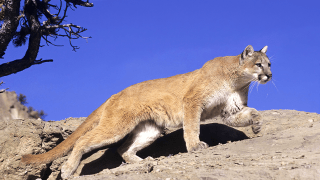
Scientists tracking two local mountain lion populations, one in the Santa Monica Mountains and another in the Santa Anas, have identified the first reproductive signs of inbreeding among these groups, which are cut off from breeding options by busy freeways.
According to the UCLA-led study -- which is available online and will be published in the January 2022 edition of the journal Theriogenology -- the animals averaged a 93% abnormal sperm rate, while some also displayed physical signs of inbreeding, like deformed tails or testicular defects.
Researchers have long had genetic evidence of inbreeding, but the malformed sperm is the first evidence that inbreeding is manifesting in the reproductive system.
“This is a serious problem for an animal that's already endangered locally,'' said the study's lead author, Audra Huffmeyer, a UCLA postdoctoral researcher who studies fertility in large cat species and is a National Geographic Explorer. ``It's quite severe.''
Get top local stories in Southern California delivered to you every morning. >Sign up for NBC LA's News Headlines newsletter.
Researchers said the results lend urgency to the need for wildlife crossings, structures that allow the mountain lions and other animals to roam further and find a broader pool of potential mates. Mountain lions -- also known as cougars -- are a bellwether species, making them a leading indicator that inbreeding could soon cause problems for other species in the Santa Monica and Santa Ana mountains, the authors said.
The California Department of Transportation has scheduled groundbreaking for early 2022 on one such wildlife crossing, a bridge over the Ventura (101) Freeway in Agoura Hills, thanks to a mix of public and private funding.
Biologists and land managers hope this project will lead to more crossings. Early plans are being formulated for a possible structure over Interstate 15 in Riverside County.
Local
Get Los Angeles's latest local news on crime, entertainment, weather, schools, COVID, cost of living and more. Here's your go-to source for today's LA news.
The latest study draws on work by scientists from UCLA, the National Park Service's Santa Monica Mountains National Recreation Area and the UC Davis Wildlife Health Center. Both the NPS and UC Davis are carrying out long-term studies of Southern California mountain lion populations, currently following 17 cats.
Over the past year, the research team identified nine adult males from the Santa Monica and Santa Ana ranges with signs of inbreeding, including the first evidence of reduced fertility.
Their findings are similar to the signs of severe inbreeding seen early on among most Florida panthers in the 1990s, including the kinked tails, undescended testes and teratospermia (60% or more abnormal sperm), Huffmeyer noted. The Florida panther population only recovered with the introduction of mountain lions from Texas.
“The Florida panthers were also severely isolated and severely inbred, so the fact that we're seeing the same traits in our mountain lion population is alarming,'' she said. ``If we don't do anything to introduce more genetic diversity to the Southern California mountain lions, we will have more males with reproductive problems, fewer kittens and a lower rate of kitten survival.''
The scientists cited a real risk of extinction for the mountain lions in the Santa Monica and Santa Ana ranges. Once significant inbreeding depression is found -- meaning decreased fertility and reduced kitten survival - - extinction is predicted to occur within 50 years, according to 2016 and 2019 papers evaluating population viability that included scientists from UCLA, NPS, UC Davis, the University of Wyoming, and the University of Nebraska.
While a few mountain lions -- in particular the cougar known as P-22, who frequents Griffith Park -- have successfully crossed freeways, far more have been killed trying to do so.



